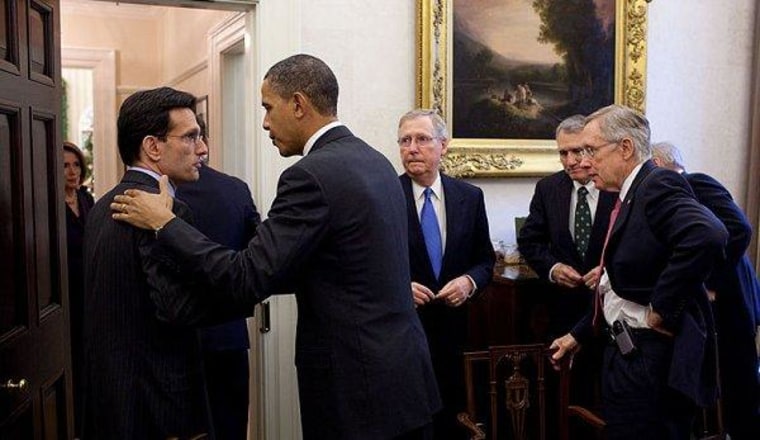About an hour after the Democratic convention had wrapped up for the evening, Mitt Romney's campaign issued a statement responding to the day's most notable speech.
"Bill Clinton worked with Republicans, balanced the budget, and after four years he could say you were better off," Romney campaign spokesman Ryan Williams said. "Barack Obama hasn't worked across the aisle -- he's barely worked with other Democrats -- and has the worst economic record of any president in modern history."
In a series of strange tweets, Newt Gingrich pushed a similar line this morning, saying Clinton "worked with the GOP, Obama didn't."
That would be the same Clinton who congressional Republicans impeached and tried to drive from office.
But putting that aside for a moment, there is a fair amount of interest right now in the larger question: President Obama desperately wanted to work with both parties to advance the nation's common interests, and that hasn't come to fruition. The Washington Post ran a 5,000-word piece the other day, making the not-so-bold case that both sides share responsibility.
There's ample evidence to the contrary. Indeed, I'm not sure if Republicans noticed, but Clinton himself spoke at some length last night about GOP obstructionism.
"[W]e all know that he also tried to work with congressional Republicans on health care, debt reduction and new jobs. And that didn't work out so well. But it could have been because, as the Senate Republican leader said in a remarkable moment of candor two full years before the election, their number one priority was not to put America back to work; it was to put the president out of work. Well, wait a minute. Senator, I hate to break it to you, but we're going to keep President Obama on the job."
Look, there's no great mystery here. President Obama appointed Republicans to key posts in his administration, and incorporated Republican ideas into his policy agenda. He demonstrated a willingness to work with GOP officials on just about every issue under the sun.
On the other hand, there were congressional Republicans who huddled, literally on Obama's first day, and agreed to adopt "unyielding opposition" to every White House measure. The Senate GOP leadership decided before the president was even inaugurated that they would not compromise on anything. Shortly after the inauguration, one House Republican leader said his caucus was prepared to emulate the "insurgency" tactics of "the Taliban."
I realize the political establishment has rules, and those rules dictate that both sides must always be blamed for partisan strife, but there are some pesky facts that point in a very different direction.
Indeed, have we forgotten the thesis from Thomas Mann and Norm Ornstein?
We have been studying Washington politics and Congress for more than 40 years, and never have we seen them this dysfunctional. In our past writings, we have criticized both parties when we believed it was warranted. Today, however, we have no choice but to acknowledge that the core of the problem lies with the Republican Party.The GOP has become an insurgent outlier in American politics. It is ideologically extreme; scornful of compromise; unmoved by conventional understanding of facts, evidence and science; and dismissive of the legitimacy of its political opposition.When one party moves this far from the mainstream, it makes it nearly impossible for the political system to deal constructively with the country's challenges."Both sides do it" or "There is plenty of blame to go around" are the traditional refuges for an American news media intent on proving its lack of bias, while political scientists prefer generality and neutrality when discussing partisan polarization. Many self-styled bipartisan groups, in their search for common ground, propose solutions that move both sides to the center, a strategy that is simply untenable when one side is so far out of reach.
"Obama hasn't worked across the aisle"? Reality shows, for better or for ill, he's reached his hand out to his foes, perhaps even more than he should have. In each instance, it's been slapped away.
